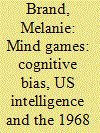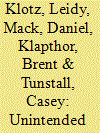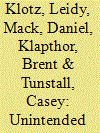|
|
|
Sort Order |
|
|
|
Items / Page
|
|
|
|
|
|
|
| Srl | Item |
| 1 |
ID:
166780


|
|
|
|
|
| Summary/Abstract |
This article examines the impact of cognitive bias on the analytic output of the United States intelligence community during the Prague Spring. Utilising a range of primary sources, including declassified documents, oral history and contemporary accounts, this article argues that as a result of heuristic biases, analysts formed the mindset that the Soviet Union would not invade Czechoslovakia, and did not alter that assumption in the face of increasing evidence to the contrary. Consequently analysts possessed a distorted understanding of both Soviet intentions and the prevailing political environment and did not accurately convey the likelihood of military action to consumers.
|
|
|
|
|
|
|
|
|
|
|
|
|
|
|
|
| 2 |
ID:
132432


|
|
|
|
|
| Publication |
2014.
|
| Summary/Abstract |
Much of today's intelligence literature emphasizes the role of cognitive bias and organizational pathologies in the explanation of intelligence failure. Adversary deception complicates the problem, not only for intelligence analysts and managers but for intelligence theorists as well. Operation Bodyguard, the deception plan covering Allied landings in Normandy in northwestern France in June 1944, is a case in point. Although German intelligence and decisionmaking displayed flaws, Bodyguard was such a monumental and masterful counterintelligence and deception operation that even perfectly rational individuals and organizations might have struggled to divine the truth through its fog and misdirection. Much of its deceptive power derived from the exploitation of human psychological traits that have come to be understood scientifically only in recent decades.
Although a famous historical event (associated with one of World War II's most famous quotations), Bodyguard warrants re-examination in light of modern psychology and intelligence theory. This battle between intelligence and deception is valuable as a case study in the general theory of deception and its underlying cognitive factors, understanding and mastery of which are vital to success in information-age conflict.
|
|
|
|
|
|
|
|
|
|
|
|
|
|
|
|
| 3 |
ID:
096722


|
|
|
|
|
| Publication |
2010.
|
| Summary/Abstract |
In the U.S., where buildings account for 40% of energy use, commercial buildings use more energy per unit area than ever before. However, exemplary buildings demonstrate the feasibility of much better energy performance at no additional first cost. This research examines one possible explanation for this inconsistency. The aim is to investigate whether the anchoring bias, which refers to our tendency to gravitate towards a pre-defined standard regardless of its relevance, influences energy performance goals in building design. The scope examines professionals who help set energy performance goals for U.S. buildings. Prior to being asked to set an energy performance goal, these professionals were randomly directed to one of three series of questions. One series set an anchor of 90% energy reduction beyond standard practice, one set a 30% anchor, and one set no anchor. Respondents exposed to the 90% anchor, and respondents exposed to no anchor at all, set higher energy performance goals than respondents exposed to the 30% anchor. These results suggest that building rating systems that only reward incremental energy improvements may inadvertently create anchors, thereby discouraging more advanced energy performance goals and inhibiting energy performance that is technically and economically feasible.
|
|
|
|
|
|
|
|
|
|
|
|
|
|
|
|
| 4 |
ID:
097515


|
|
|
|
|
| Publication |
2010.
|
| Summary/Abstract |
In the U.S., where buildings account for 40% of energy use, commercial buildings use more energy per unit area than ever before. However, exemplary buildings demonstrate the feasibility of much better energy performance at no additional first cost. This research examines one possible explanation for this inconsistency. The aim is to investigate whether the anchoring bias, which refers to our tendency to gravitate towards a pre-defined standard regardless of its relevance, influences energy performance goals in building design. The scope examines professionals who help set energy performance goals for U.S. buildings. Prior to being asked to set an energy performance goal, these professionals were randomly directed to one of three series of questions. One series set an anchor of 90% energy reduction beyond standard practice, one set a 30% anchor, and one set no anchor. Respondents exposed to the 90% anchor, and respondents exposed to no anchor at all, set higher energy performance goals than respondents exposed to the 30% anchor. These results suggest that building rating systems that only reward incremental energy improvements may inadvertently create anchors, thereby discouraging more advanced energy performance goals and inhibiting energy performance that is technically and economically feasible.
|
|
|
|
|
|
|
|
|
|
|
|
|
|
|
|
|
|
|
|
|